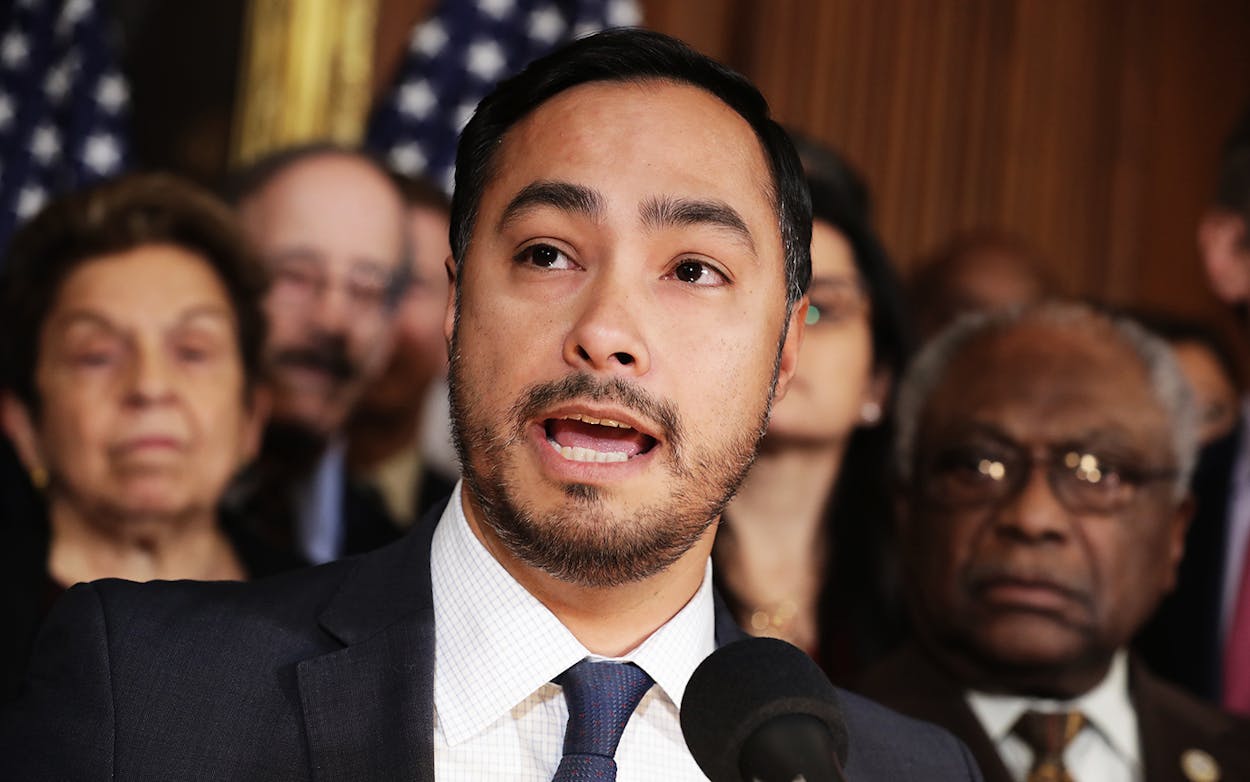In the growing standoff between two branches of federal government, it was a big victory for House Democrats Tuesday as Speaker Nancy Pelosi and members celebrated passage of a resolution that would block President Trump from an emergency declaration to circumvent Congress and secure funding to build a border wall. The House voted 245 to 182 to terminate Trump’s declaration, with 13 Republicans joining the Democrats to pass the resolution.
But it was an especially big victory for the man at the center of Tuesday’s vote: U.S. Representative Joaquín Castro. The San Antonio Democrat and, until now, the lesser-known identical twin of presidential candidate Julián Castro, came up with the idea weeks ago of a privileged joint congressional resolution to try to stop Trump. Ultimately, it may be up to the third branch of government—the U.S. Supreme Court—to decide the president’s fate. But Tuesday may have marked a breakout moment for Joaquín, newly sporting a beard and no longer an identical twin for the first time in his life.
What Castro does with this moment is always subject to political conjecture. But a new poll that was also released on Tuesday suggests that Texas voters’ views of Senator John Cornyn may make him more vulnerable in his effort to get reelected next year—and may present an opportunity for Castro should he want to make a move to the upper chamber of Congress.
“This is a momentous event for Joaquín Castro, and a credit to Castro’s political acumen to position himself to be the author of one of the most politically salient pieces of legislation of the Trump presidency,” said Mark P. Jones, professor of political science at Rice University. “When you’re in the minority as Castro was for his first three terms, it is very difficult to accomplish much of anything in the U.S. House, where the majority party holds all the cards and calls all the shots. This legislation catapults Castro onto the national stage.”
At a press conference Monday afternoon in the ornate Rayburn reception room (named for a former House speaker from Texas, Sam Rayburn), Castro, just elected to his fourth term, and surrounded by Pelosi, House leaders, and other members, was definitely the star attraction. It marked the third press conference with Pelosi since Friday and the third time that she sang Castro’s praises for taking a leadership role on the legislation that faces an almost certain presidential veto—if it makes it out of the Republican controlled Senate, which considers the legislation next.
“About six weeks ago—when the rumors started that President Trump might declare a national emergency to build his border wall across the U.S.-Mexico border—my staff and I began working with Legislative Counsel to try to find a way to make sure that Congress would have a say in this matter,” said Castro. “The result of that is [House Joint Resolution] 46, which would terminate the president’s declaration of a national emergency to build his border wall.”
Castro’s adroit legislative maneuver gave Democratic congressional lawmakers, newly in the majority, something immediate to grab onto and run with. It also gives Pelosi an opportunity to pit a rising Hispanic star from a border state where construction of a wall is all but certain against the president. “I salute Congressman Castro for his work leading up to the moment, so that we are ready. He is chair of the Congressional Hispanic Caucus. He is a distinguished member of Congress from the state of Texas, which has the longest border with Mexico. But this isn’t about the border, this is about the Constitution of the United States. This is not about politics. It’s not about partisanship. It’s about patriotism.”
And Texans, at least, seem to agree. A Quinnipiac University poll released Tuesday found that Texas voters disapprove 60 percent to 39 percent of President Donald Trump using emergency powers to fund a border wall. The vote came as Texas voters responding to the poll were split 48 percent to 48 percent on whether to even build a wall, according to the poll. (The survey was taken between February 20 and February 25 of 1,222 Texas voters. It has a margin of error of +/- 3.4 percentage points.)
“Our country, since its founding, has become the most prosperous and powerful nation on earth without any wall,” Castro said before the House vote. “That’s why I believe most of the American people, and most people in my home state of Texas, disagree with the president building a wall across our border. The president consistently said that any wall would be paid for Mexico. Well, Mexico refused to pay. And Congress refused to pay. And so the president, rather than letting things be, decided he would act unilaterally, unconstitutionally, by usurping the power of Congress.”
Beyond his standing in the House, Castro may find a way to leverage Tuesday’s victory. “It may open up a statewide race for him,” said Cal Jillson, professor of political science at Southern Methodist University. Both Castro brothers last year passed on a Senate challenge to Ted Cruz, who ultimately came dangerously close to losing to former House member Beto O’Rourke. But voters appear to like Cruz’s performance better than Cornyn’s. Voters approved of the job Cruz is doing by a margin of 51 to 40 percent. They approved of the job Cornyn is doing by a margin of 43 to 26 percent.
“As opportunities go, this opportunity today is big,” Jillson said. “Joaquín Castro’s big moment comes today. There may be other moments. Today is his opportunity to present himself to Texas and to the nation.”






